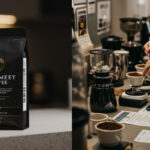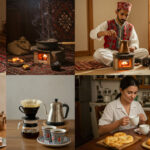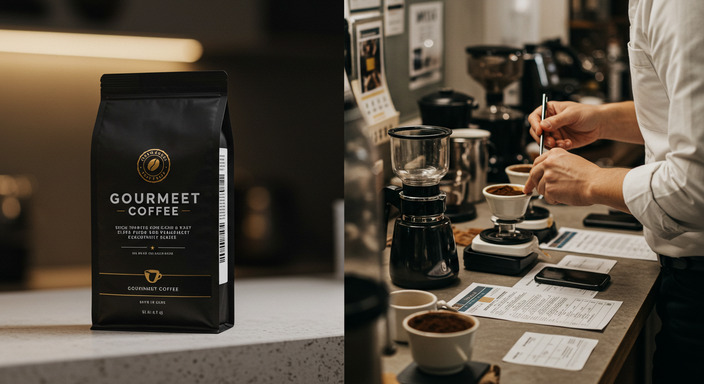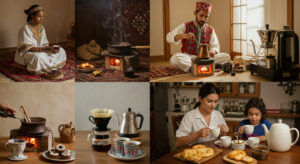
How is specialty coffee defined?

Table of Contents
ToggleIn a bustling café with the intoxicating aroma of freshly brewed coffee wafting through the air, a debate unfolds among patrons: “What exactly defines specialty coffee?” This question triggers curiosity, akin to the intrigue faced by coffee enthusiasts worldwide. Specialty coffee, a term often touted in gourmet circles, signifies more than just an exceptional cup; it represents an entire philosophy that embodies precise farming practices, meticulous processing, and superior flavor profiles. As with vintage wines and artisanal cheeses, specialty coffee demands a discerning palate and an appreciation for quality that extends beyond the sensory.
The Origins of Specialty Coffee
The concept of specialty coffee can be traced back to the 1970s, a period marked by a pivotal shift in consumer expectations and coffee production practices. This era, often referred to as the “First Wave” of coffee, saw mass-market brands focusing on convenience rather than quality. However, in response to growing dissatisfaction, the specialty coffee movement emerged, as consumers began seeking a more refined and flavor-rich coffee experience. This burgeoning interest in high-quality brewing laid the foundation for specialty coffee shops aimed at elevating the standard of what was considered a good cup of joe.
Understanding the Criteria
For a coffee to be considered “specialty,” it must meet stringent criteria. The Specialty Coffee Association (SCA) has been instrumental in defining these standards, which encompass various production stages from cultivation to roasting. A crucial component is the SCA cupping score, where the coffee must score 80 points or above on a 100-point scale to qualify as specialty grade. This assessment covers attributes such as aroma, flavor, aftertaste, acidity, body, balance, and uniformity. The coffee must also be free of defects, ensuring a clean and consistent quality.
| Attribute | Description | Cupping Importance |
|---|---|---|
| Aroma | The fragrance of the coffee | Significant |
| Flavor | The perception of taste | Crucial |
| Aftertaste | The lingering taste after consumption | Moderate |
| Acidity | The pleasant tangy sensation | Important |
| Body | The tactile feeling of the coffee in the mouth | Essential |
The Role of Terroir
Terroir, a term borrowed from the wine industry, plays a vital role in defining specialty coffee. It refers to the environmental factors such as soil, climate, and altitude where the coffee is grown, all of which impart distinct characteristics to the beans. The delicate interplay between these elements results in the unique taste profiles that differentiate an Ethiopian Yirgacheffe from a Guatemalan Antigua. Coffee farmers and roasters capitalize on these distinctions, catering to consumer preferences for unique and traceable flavor notes.
“Specialty coffee is not just about technical excellence; it’s a relational, economic activity rooted in quality connections from crop to cup.” — Coffee Experts
The Economics of Specialty Coffee
The economics surrounding specialty coffee are multifaceted, intertwining aspects of fair trade, sustainable practices, and premium pricing. For many coffee farmers, transitioning to specialty production offers a path to improved income and industry reputation. The specialty sector promotes transparency and fair compensation, with consumers often willing to pay higher prices for ethically sourced and environmentally sustainable products. However, the market remains highly competitive, necessitating continual quality maintenance and innovation from producers.
The Impact of Specialty Coffee on Coffee Culture
Specialty coffee has considerably influenced global coffee culture, shaping consumer preferences towards craft and artisanal coffee experiences. Baristas, often regarded as the artisans of this craft, undergo extensive training to perfect brewing techniques and enhance the consumer’s sensory experience. As a result, coffee connoisseurs are willing to explore unique brewing methods such as pour-overs, siphons, and cold brews, embracing the nuances that each method reveals in coffee’s flavor profile.
Challenges in the Specialty Coffee Industry
Despite its growth and positive influence, the specialty coffee industry faces significant challenges. Climate change is a critical concern, threatening the supply chain with extreme weather patterns that impact crop yields and quality. Additionally, the complexity of maintaining equitable supply chain relationships amidst fluctuating market demands poses difficulties in ensuring long-term sustainability. Collaboration across the industry and innovative agricultural practices are essential in overcoming these hurdles.
The Future of Specialty Coffee
Looking forward, the specialty coffee sector is poised for continued evolution. Innovations in technology and methodology may redefine traditional notions of coffee quality, while growing consumer consciousness around sustainability drives the demand for ethical sourcing. Furthermore, the rise of coffee tourism and experiential cafés emphasizes coffee’s cultural significance beyond consumption, enriching the global appreciation for this beloved beverage.
Exploring the Coffee Value Chain
Diving deeper into the coffee value chain reveals a complex web of interactions between farmers, exporters, roasters, and baristas. Each step influences the final product’s quality, from the cultivation of high-altitude beans to their careful roasting and brewing. Innovations in processing, such as honey and natural methods, highlight the versatility of coffee, offering broadened flavor spectrums that cater to diverse consumer palates.
1- Farmers leverage local environmental conditions to cultivate premium crops.
2- Exporters ensure meticulous sorting and quality assurances.
3- Roasters employ precision techniques to accentuate bean attributes.
4- Baristas harness expertise to craft the final exquisite cup.
Incorporating Specialty Coffee Into Daily Life
For the average coffee drinker, incorporating specialty coffee into daily life can enhance both personal enjoyment and consumer consciousness. Investing in quality single-origin beans and experimenting with home brewing techniques such as AeroPress or Chemex can elevate the experience. Moreover, supporting local roasters and cafés that prioritize ethical sourcing reinforces the commitment to sustainability and quality improvement within the industry.
FAQ – Common Questions
What is the difference between regular and specialty coffee?
Specialty coffee is distinguished by its superior quality, with higher scores on the SCA cupping scale and attention to factors like origin, processing, and flavor.
Why does specialty coffee cost more?
The higher price reflects the extensive quality control, sustainable practices, and ethical sourcing involved, ensuring a premium product for consumers.
Is organic coffee the same as specialty coffee?
Not necessarily. While organic coffee focuses on specific environmental practices, specialty coffee emphasizes quality, although some specialty coffees may also be organic.
How do terroir and processing affect coffee flavor?
Terroir influences the natural flavor profile based on region-specific factors, while processing methods can accentuate or alter these inherent characteristics.
Can I brew specialty coffee at home?
Yes, with the right equipment and techniques, such as precise water temperature and grind size, you can enjoy specialty coffee from the comfort of your home.
What role does a barista play in the specialty coffee experience?
Baristas are pivotal in crafting the coffee experience, employing skill and technique to highlight the nuances of specialty coffee in every cup.
Conclusion
Specialty coffee is more than a beverage—it’s an embodiment of artisanal craftsmanship, a beacon of quality and sustainability that encourages consumers to savor each sip. As coffee enthusiasts embark on their journey through the intricate world of specialty coffee, they contribute to a legacy of appreciation and respect for this cherished cup. Whether enjoyed in a local café or brewed meticulously at home, specialty coffee continuously enriches the global coffee culture, offering an unforgettable sensory adventure.
Meta Descrição: Discover the intricacies of specialty coffee, from its defining criteria and terroir influence to its role in shaping coffee culture. Explore the world of premium brews today!
is an editor at Coffee With Finance and a true coffee enthusiast. He explores roasts, flavors, origins, and brewing methods, sharing stories that captivate both beginners and experts. Petter believes great coffee sparks meaningful moments—and that includes simple, jargon-free talks about personal finance. His content blends aroma, flavor, and insight, making each coffee break an inspiring and enriching experience.




























Post Comment